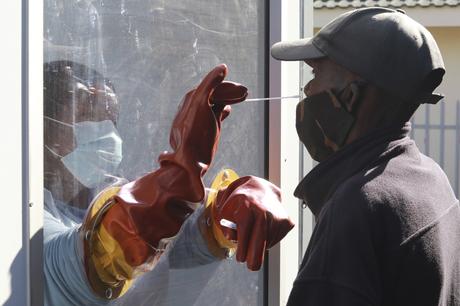
(Johannesburg) The COVID pandemic – 19, which initially progressed less quickly in Africa than in other regions of the world, is now accelerating on the poorest continent, a source of concern for the World Health Organization (WHO).
Posted on 28 July 2020 at 720
Susan NJANJI with AFP African offices
France Media Agency
According to figures compiled by AFP on Tuesday, some 860 000 cases have been recorded across the continent, with at least 18 00 death.
The figures are still low, compared to Europe or the United States, but the director of health emergencies at the WHO, Michael Ryan, recently said he was “concerned” by the ” acceleration ”of the epidemic in Africa, where public health systems are failing.
Early and strict containment measures have, at first, “slowed down the progression” of the disease in Africa, noted Mary Stephens, expert from the WHO regional office in Africa, interviewed by the 'AFP.
But the peak of the pandemic is coming, she warned, as many countries have relaxed restrictions to prevent their economies from collapsing.
Here is an update on the situation in key countries of sub-Saharan Africa:
South Africa, the epicenter
South Africa is by far the most affected country on the continent, with more than 285 000 cases, including 7067 death. Globally, it ranks fifth among the countries with the highest number of infections.
The mortality rate remains low there (1.6% of cases). But it could be grossly underestimated. According to researchers, approximately 17 000 additional deaths, not counted among COVID deaths – 19, have been recorded since early May, compared to the same period last year.
The Minister of Health Zweli Mkhize warned that “the peak (of the pandemic) will be in July, August and September”.
The country imposed one of the strictest confinements in the world at the end of March, before easing it. In the face of the explosion of contaminations, schools have once again been closed for a month and a night curfew has been reinstated.
Nigeria, the most populous
Nigeria, which is home to 91 millions of inhabitants, is the second most affected country in sub-Saharan Africa with over 41 000 cases, of which at least 509 died.
However, the figures could be greatly underestimated for lack of available tests. The country only performs 3000 daily tests, around a tenth of the number of tests done in South Africa which has a quarter of the Nigerian population.
“For each identified case, others escape us because we cannot test everyone,” admitted Sani Aliyu, head of the working group responsible for fighting the virus.
In the economic capital Lagos, epicenter of the pandemic in Nigeria, there will quickly be a problem of space to isolate patients, warned the municipal health official, Akin Abayomi.
White school year in Kenya –
The number of cases in Kenya has tripled in one month, with almost 16 000 confirmed contaminations, of which 285 death.
Under pressure from the private sector, the country recently lifted the ban on leaving or going to Nairobi and Mombasa (east), the main foci of the epidemic.
But on Monday, President Uhuru Kenyatta announced the ban on the sale of alcohol in restaurants and the one month extension of the nighttime curfew to halt the “aggressive” spread of COVID – 19.
Primary and secondary schools will only reopen in January 2020.
First peak in Cameroon
Cameroon, which has not imposed strict containment, is the most affected Central African country with more than 16 000 case.
“A first peak of the epidemic occurred between the end of June and the beginning of July”, according to Yap Boum, representative for Epicenter Africa, the research and epidemiology branch of Doctors Without Borders (MSF). But “this does not mean that the pandemic is over, no! », He insists.
Madagascar and its “herbal tea”
President Andry Rajoelina praises the virtues, according to him, preventive and curative of a herbal tea against COVID – 18, made from an artemia plant. However, no scientific study has confirmed its effectiveness.
The herbal tea has been widely distributed free of charge in the country, but the number of contaminations continues to increase (9690, including 91 death).
The case of Djibouti –
Djibouti, a confetti state with one million inhabitants, is the second most affected country in East Africa in terms of the number of cases (more than 5000 infections).
The government explains these figures by its strong capacity to test (more than 5% of the population) and its aggressive policy of tracing patients.
Tanzania in denial
Tanzania is one of the few countries in the world denying the severity of the virus. At the end of April, it published its latest figures on COVID – 18, reporting 509 case.
President John Magufuli says there is no more contamination. “That's the reason we don't wear the mask. Do you think that we are not afraid of dying? It’s because there is no COVID, ”he said on Monday.

